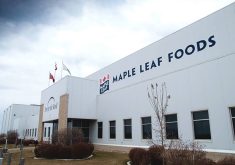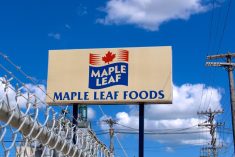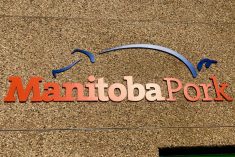Reuters — Canadian meat packing company Maple Leaf Foods is hunting for acquisitions in the U.S., after years spent upgrading old factories and shedding business lines, its CEO said on Wednesday.
Maple Leaf, which reported on Wednesday its profits doubled in the fourth quarter, sees growth opportunities from meat produced humanely and without antibiotics, and from snack foods and alternative proteins made from soy and other plants.
On Tuesday, the company said it would buy U.S.-based Lightlife Foods, a manufacturer of plant-based protein foods, for US$140 million.
Read Also

JBS profit falls amid still-challenging US market environment
JBS, the world’s largest meat company, reported a net profit fall in the third quarter in spite of a rise in global net sales amid a still-challenging beef market environment in the U.S., according to an earnings statement on Thursday.
It was Maple Leaf’s first material deal since 2004, and represents broadly the expected price level of future acquisitions, CEO Michael McCain said in an interview.
The company, which has a $4 billion market cap, intends to remain a patient buyer, but after returning to healthier profits, Maple Leaf’s opportunities are the highest “in decades,” he said.
“We have a very active portfolio today of opportunities, but that doesn’t necessarily mean we complete transactions,” McCain said. “It’s important for us to have a very large pipeline but equally to be very disciplined.”
The Toronto-based company will use cash on hand to pay for acquisitions, McCain said. It had nearly $404 million at the end of 2016.
Fourth-quarter net earnings more than doubled to $76.2 million, or 56 cents per share.
On an adjusted basis, Maple Leaf earned 31 cents per share, missing analysts’ average estimate of 33 cents per share, according to Thomson Reuters I/B/E/S.
Total sales for the Canadian pork processor fell about five percent to $828.2 million, below analysts’ average estimate of $860.5 million. Excluding the contribution of the 53rd week in 2015, sales increased by about two per cent.
McCain, 58, has steered Maple Leaf since 1995, and may be best known as the face of the company’s contrite handling of a 2008 tainted meat recall, which involved the deaths of 22 people.
The company also announced changes to its governance agreement with McCain, its largest shareholder, and an affiliated organization. It allows McCain to bump up his stake to 45 per cent from 35 per cent currently, or to take it over entirely.
The move was made to reflect changes in Canadian securities regulations, and does not signal plans to privatize or sell the company, McCain said.
Maple Leaf’s shares gained 0.3 per cent at $29.94 in Toronto.
— Rod Nickel is a Reuters correspondent covering the agriculture and mining sectors from Winnipeg. Additional reporting for Reuters by Komal Khettry in Bangalore.














